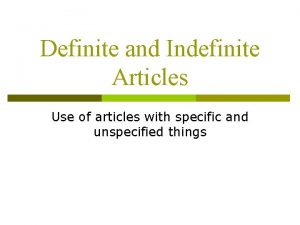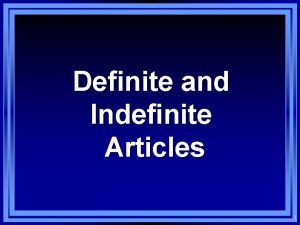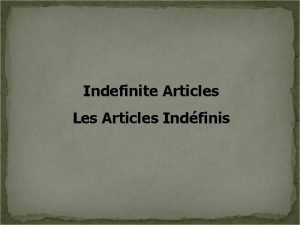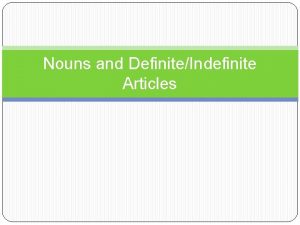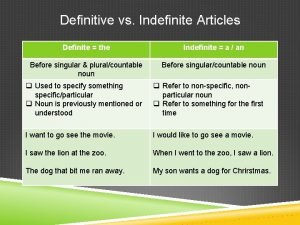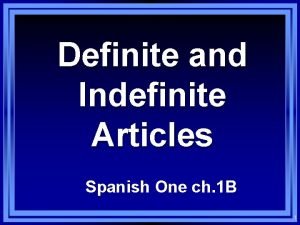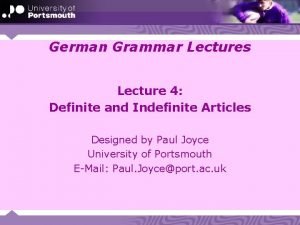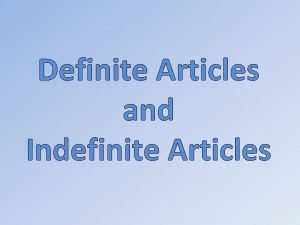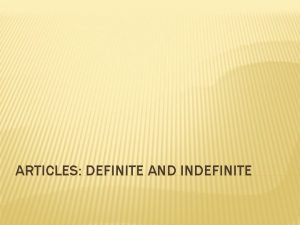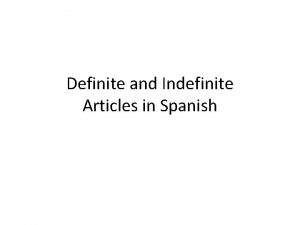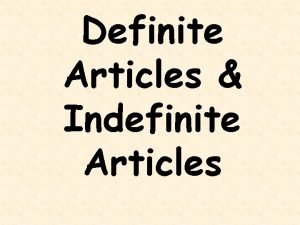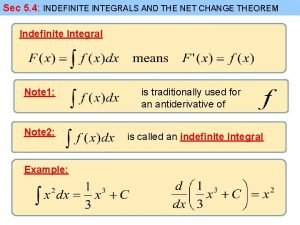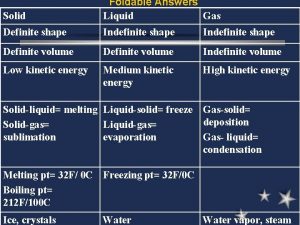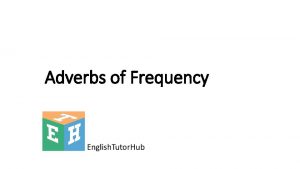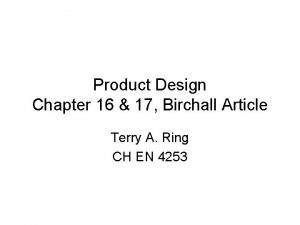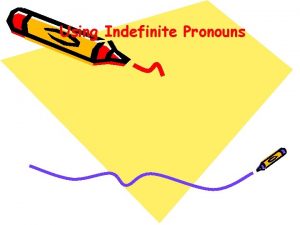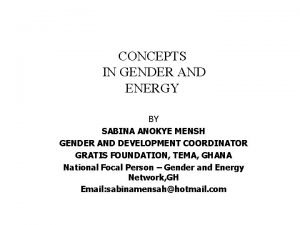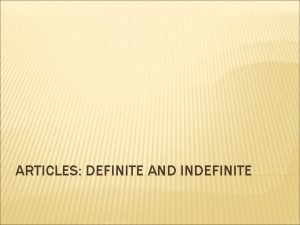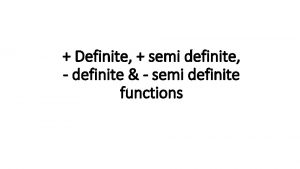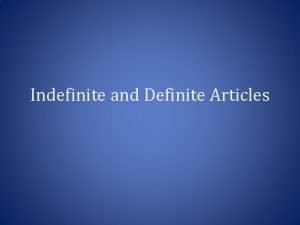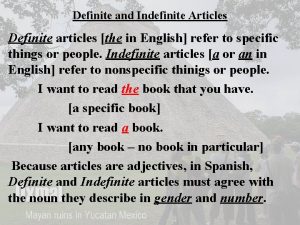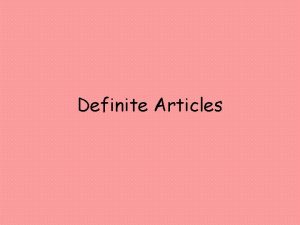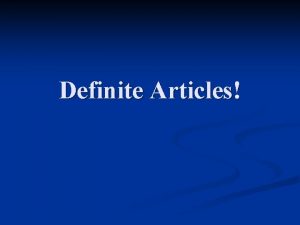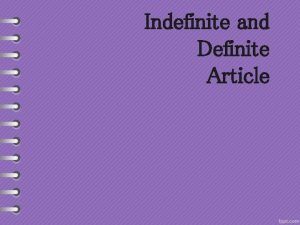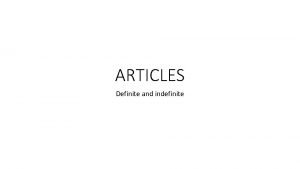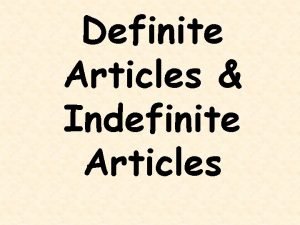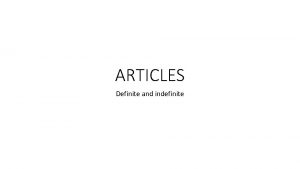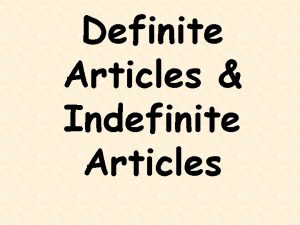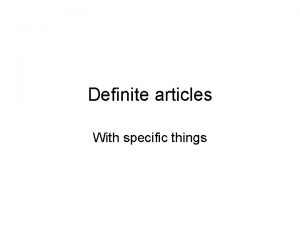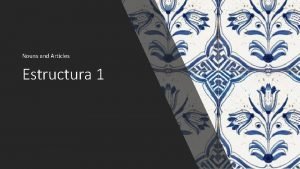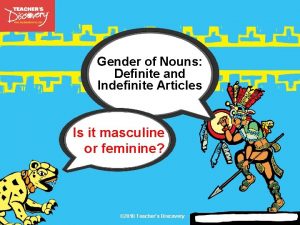Notas nouns gender definite articles indefinite articles hay


















- Slides: 18

Notas: nouns, gender, definite articles, indefinite articles, hay, making nouns plural

Nouns & Gender • Nouns name 4 types of things: – – People Places Things Ideas (concepts)

Nouns & Gender • Nouns in Spanish are either masculine or feminine • Most nouns that end in –o are masculine • Most nouns that end in –a are feminine • The word that means masculine or feminine is gender • Nouns that do not follow that general rule must be memorized.

Nouns & Gender Using the “-o” & “-a” rule, determine if the following nouns are masculine (M) or feminine (F). M. a. escritorio F. b. mesa M. c. bolígrafo M. d. cuaderno e. tiza F. f. pizarra F. g. puerta M. h. libro F.

Nouns & Gender Can you name some nouns from our list that do not fit the general rule and that must be memorized?

Definite Articles • There is only one definite article in English. • It is the word “the”. • There are four definite articles in Spanish.

Definite Articles Singular Plural Masculine el los Feminine la las

Definite Articles Write the definite article that goes with each noun. a. bolígrafo las b. mesas los c. escritorios la d. carpeta el las los la el e. puertas f. libros g. tiza h. cuaderno

Indefinite Articles • Indefinite articles are used to refer to things in general (non-specific things) • There are four indefinite articles in Spanish.

Indefinite Articles Singular Masculine Feminine Plural un unos unas a, an some, a few

Articles – Definite & Indefinite • To know which article to use with a particular noun, you have to ask yourself 2 questions: – Is the noun masculine or feminine? – Is the noun singular or plural?

Fill in the blanks with the correct indefinite articles & write the English meaning. (don’t forget to ask yourself the 2 questions!) unas carpetas = some folders _______ una silla = a chair _______ un libro = _______ a book unos cuadernos = some notebooks _______

Hay • In a sentence “hay” means: – There is – There are • In a question “hay” means: – Is there…? – Are there…?

Hay Por ejemplo: • Hay una pizarra en el colegio. There is a chalkboard in the school. • ¿Hay un bolígrafo en la mochila? Is there a pen in the backpack?

Sí y No (answering questions) • When answer a question affirmatively, you will usually begin your response with sí. • When answering negatively, begin with no & put a 2 nd no before “hay” or the verb.

Sí y No (answering questions) Por ejemplo: ¿Hay tarea? Sí, hay tarea. No, no hay tarea.

Making Nouns Plural • If the noun ends in a vowel, add “s” – diccionarios • If the noun ends in a consonant, add “es” – papeles • If the noun ends in “z”, change the “z” to “c” and add “es” – lápiz lápices

Making Nouns Plural Write the following words in the plural form. 1. 2. 3. 4. 5. 6. teléfono computadora reloj luz hoja profesor teléfonos computadoras relojes luces hojas profesores
 The definite articles in spanish
The definite articles in spanish Definite and indefinite
Definite and indefinite Definite and indefinite articles in french
Definite and indefinite articles in french Definite articles in spanish
Definite articles in spanish Definite vs definitive
Definite vs definitive Examples of indefinite articles in spanish
Examples of indefinite articles in spanish German definite and indefinite articles
German definite and indefinite articles Definite article for clase
Definite article for clase Italian definite article
Italian definite article Definite articles in french
Definite articles in french Mochila indefinite article
Mochila indefinite article Definite vs indefinite articles spanish
Definite vs indefinite articles spanish Plural nouns y gender nouns
Plural nouns y gender nouns Definite integral and indefinite integral
Definite integral and indefinite integral Solid liquid gas foldable
Solid liquid gas foldable Adverbs of frequency exercises doc
Adverbs of frequency exercises doc Agenda web definite and indefinite article
Agenda web definite and indefinite article Indefinite adjectives and pronouns
Indefinite adjectives and pronouns Strategic gender needs and practical gender needs
Strategic gender needs and practical gender needs
